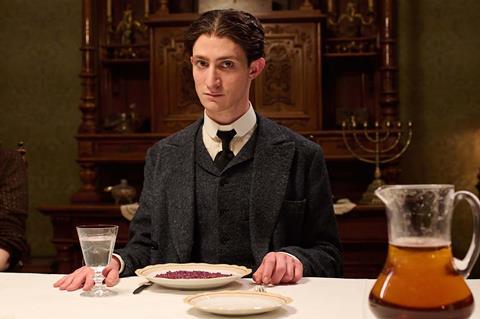Holland takes an unconventional approach to the biopic, which hits familiar narrative beats

Dir: Agnieszka Holland. Czech Republic/Germany/Poland. 2025. 128mins
The life and work of Czech writer Franz Kafka have been much documented; an intriguing snippet of information in this latest biopic claims that for every (surviving) word he wrote, 10 million have been written about him. But his story has certainly never been approached in the way it is in Franz, director Agnieszka Holland choosing to present a fragmented portrait of the influential author that at first appears rather overworked, but slowly coalesces into an intriguing – if not entirely successful – study of art and legacy.
The passion and admiration Holland has for Kafka is palpable
Franz plays San Sebastian and then Busan after premiering in Toronto, and should appeal both to fans of the author – who wrote such seminal works as The Metamorphosis and The Trial – and the filmmaker, who most recently directed 2024’s The Green Border about the refugee crisis at the Poland-Belarus border. This is the culmination of Holland’s long-standing passion for Kafka (she previously adapted The Trial for Polish television) and its affectionate, playful approach should help endear it to audiences. That it has been selected by Poland as its official Oscar entry should also raise its profile.
As suggested by the use of Kafka’s first name for its title, Holland’s film takes an intimate, personal approach. We first meet the taciturn young Franz (Daniel Dongres) having his hair cut by his larger-than-life father (Peter Kurth), who looms over him with the scissors, establishing a power dynamic that will last throughout Franz’s life. That he is always trying to get out from under his traditionalist father’s shadow – or at the very least impress him – is one of Franz’s motivations as he writes the works that will come to define him.
While that body of work has now become a bastion of modern literature, Kafka was largely unrecognised in his own short lifetime (he died in 1924 of tuberculosis, aged 40). To that end, Holland puts the focus on Kafka the man, who lived a decidedly uncinematic life in a German-speaking Jewish family in Prague. The screenplay, written by Holland and Marek Epstein, attempts to breathe some drama into proceedings by jumping around in its chronology – although, underneath all the cinematic quirks, the narrative throughline remains familiar, the film knitting together key moments from Kafka’s life.
There’s a public reading of his 1914 short story The Penal Colony, a visceral study of corporal punishment which Holland dramatizes in lurid detail – the only moment in which the film directly engages with Kafka’s work or its contemporary impact. There’s his extended engagement to Felice Bauer (Carol Schuler), his dalliance with Felice’s best friend Grete Bloch (Gesa Schermuly), his brief, passionate affair with married Czech journalist Milena Jesenska (Jenovefa Bokova). Moments in his chaotic family home, in which Kafke is beset by opinions from all sides, feed his constant search for silence and peace. Fittingly, sound design fom Michaela Patrikova often foregrounds the everyday noises which encroach onto Franz’s consciousness, acting as a distraction.
As played in a restrained performance by impressive newcomer Idan Weiss – who bears an uncanny resemblance to the man – this Franz is unassuming and completely self-absorbed, preoccupied by the complex ideas of alienation and the struggle for meaning that he attempts to unravel in his writing. He seems unmoored, buffeted by the pedestrian expectations of others. His occasional plaintive direct-to-camera looks suggest that this Franz is not only aware of the film’s audience, but that it has likely already formed an expectation of who he is – and that he is concerned he may disappoint.
Elsewhere, Holland breaks the fourth wall even further, as characters from Franz’s life speak directly to camera about their feelings, or narrate key events from both past and future. These include his sister Ottla (Katharina Stark), and his friend and fellow writer Max Brod (Sebastian Schwarz), who put himself at great risk to spirit Kafka’s work out of Nazi-occupied Prague in the late 1930s. This is detailed in a moving coda that also sensitively references the Holocaust, which targeted ideological free-thinkers like Kafka and claimed so many of his contemporaries.
It is this link between past and future – and, particularly, how it manifests through a body of work – that so intrigues Holland. At several points during the film the action suddenly jumps forward to the present day, cinematographer Tomasz Naumiuk’s sepia-toned images replaced by sharp, vivid sequences of modern-day Prague. There’s the Kafka Museum; the lake at which Kafka used to take a swim and where Japanese tourists now take selfies; the Kafka Burger joint. It remains unclear as to whether Holland is taking a swipe at the consumerism that now underpins Kafka’s memory, or drawing conspicuous parallels between his writing and the absurdity of the modern world. And while the passion and admiration she has for Kafka is palpable, and somewhat infectious, it powers a film that ends up saying more about its maker than its subject.
Production companies: Marlene Film, X Filme Creative Pool, Metro Films
International sales: Films Boutique, julien@filmsboutique.com
Producers: Sarka Cimbalova, Agnieszka Holland
Screenplay: Marek Epstein, Agnieszka Holland
Cinematography: Tomasz Naumiuk
Production design: Henrich Boraros
Editing: Pavel Hrdlicka
Music: Mary Komasa, Antoni Komasa Lazarkiewicz
Main cast: Idan Weiss, Peter Kurth, Carol Schuler, Gesa Schermuly, Jenovefa Bokova, Katharina Stark, Sebastian Schwarz
























